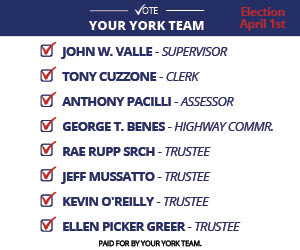Sosnowski: Bipartisan plan needed to ease funding crisis
By Bob Balgemann
Reporter
STATELINE – State Rep. Joe Sosnowski, R-Rockford, sums up the state’s continuing budget crisis this way:
The majority party ruling the Illinois House and Senate has repeatedly called for a balanced approach yet has not offered a single measure of reform to exchange for new revenue, nor put a single tax increase up for a vote.
They haven’t done that, he said, because they know the people of Illinois won’t tolerate it. So we’re in the situation we’re in, he continued, with a governor (Bruce Rauner) who has stood firm on his promise to change Springfield, opposite a majority leadership who is willing to change nothing.
The solution?
He said it’s a bipartisan plan that offers reform, revenue, spending changes and changes that create jobs for working families.
Sosnowski said some Republican bills have been introduced to address the recurring problem, bills he added that have not been given a fair hearing before lawmakers.
“Instead, we’re continually called on for reasonable solutions while, ironically, being shut out to the process by the majority party,” he said. “We can’t continue with an irresponsible spending approach. Tough decisions have to be made to save our state from further fiscal peril.”
In addition, he reiterated his commitment “to a reasonable, rational, and responsible solution to the budget crisis. Taxpayers can’t be expected to pay any more for state government before there is a guarantee their tax dollars aren’t wasted.”
About transparency
A bill introduced by state Rep. Jack Franks, D-Marengo, to increase transparency in local government has passed the House, 110-3. It has moved to the Senate for consideration.
If it becomes law, the measure would require municipalities and counties to fully disclose taxpayer-funded incentives in their annual budgets.
“Too often, local governments do not count the incentives they have awarded as an actual cost, which does a disservice to taxpayers,” Franks said. “By requiring units of government to disclose these incentives in their budgets, it will offer the public a greater understanding of the fiscal practices of their local, elected officials.”
House Bill 3760 requires local government to report the value of any tax breaks they have given as “community investment,” he said. It also mandates the state Department of Commerce and Economic Opportunity to report the total value of tax credits it has awarded in a given year. That information must be supplied to the General Assembly by Aug. 1 of each year.
“Illinois residents need to know where and how their money is being spent,” Franks said.
About double-dipping
Another Franks-sponsored bill that has passed out of the House would end the practice of retired public safety employees returning to work full-time, while continuing to draw taxpayer-funded pension payments. This one was approved in a 105-2 vote and also has moved on to the Senate.
“Retirement should mean retirement,” he said. “For too long, taxpayer dollars have been wasted on a few individuals who gamed the system for their own personal benefit. Moving forward, this legislation will put a stop to the practice of public safety employees who ‘double-dip’ at the expense of taxpayers.”
House Bill 1334 would freeze pension payments to public safety retirees who return to work full-time, until they no longer are receiving a full-time salary.
The legislation, he said, came about after reports showing some high-ranking suburban law enforcement officials had announced their retirements and began drawing taxpayer-funded pensions only to return to work as consultants for the same municipalities.
If it becomes law, the measure will affect those hired on or after Jan. 1.




